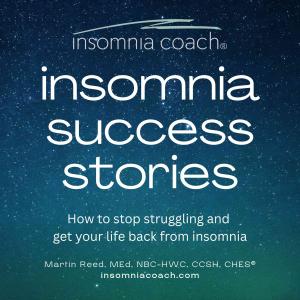Insomnia Coach® Podcast

How working with a sleep coach helped Jeff get rid of sleep-related worry and anxiety and sleep well without sleeping pills (#12)
Listen to the podcast episode (audio only) Jeff is 46 years old and married with two children — his daughter is five years old and his son is two years old. He works remotely for a real estate investment company and in his spare time he enjoys trail running, exercising, golf, and socializing with friends. Jeff often found it hard to fall asleep — especially when he was under a lot of stress. When he gained additional job responsibilities and became a parent, those difficult nights became more common and this led to a lot of sleep-related fear, worry, and anxiety. After trying to implement cognitive behavioral therapy for insomnia (CBT-I) techniques with the help of a book, Jeff continued to struggle — until he started implementing CBT-I techniques with the ongoing support and guidance of a sleep coach (me!). Within eight weeks of implementing CBT-I techniques, Jeff went from taking a sleeping pill every three to five days and managing to get around five-and-a-half hours of sleep to averaging six-and-a-half hours of sleep each night without any sleeping pills. Ten months after we stopped working together, Jeff is still sleeping well and feels far more confident about his ability to sleep. Furthermore, he now has all the skills he needs to get his sleep back on track should he ever struggle with sleep again in the future. In this episode, Jeff shares the specific CBT-I techniques he found most helpful and why working with a coach proved to be the most effective way to recover sleep confidence, get rid of sleep-related worry and anxiety, and enjoy better sleep. Click here for a full transcript of this episode.Click here to hide the transcript. Martin Reed: Welcome to The Insomnia Coach Podcast. My name is Martin Reed. I believe that nobody needs to live with chronic insomnia and that cognitive behavioral therapy for insomnia (CBT-I) techniques can help you enjoy better sleep for the rest of your life. Martin Reed: Okay. So thank you so much for being with us today, Jeff. Jeff Shetterly: Absolutely. Thanks for having me. Martin Reed: Can we get started by going back to the beginning? When did your sleep problems begin and can you remember what the initial trigger was to your sleep disruption? Jeff Shetterly: I was thinking about this question, and it's hard to pinpoint exactly when my sleep troubles started, but I feel like, for most of my life, I've really had some struggles falling asleep. Sometimes, that means it can take an hour to 45 minutes, I think, when things were sort of normal for me. That got a lot worse when I was under stress. That feels like it was with me ever since. That was probably in my 20s or teens up until now, I'm 46. Jeff Shetterly: I was thinking back to one of the first triggers that caught my attention, which was I had started working in a job that I really enjoyed and I was getting a little bit more responsibility in it, and was putting a lot of pressure on myself. I remember working toward one particular deadline and just being so anxious that I had to get this thing done. I had one of those literal sleepless nights where I got no sleep, and that had never happened. I mean, I had nights when I had gotten three or four hours of sleep, but this was a night where my anxiety just built, and built, and built every hour. I was watching the clock and getting more anxious. You know the story with all this. Jeff Shetterly: I think about 4:00 or 5:00 in the morning, I just decided, well, I'm up for the day so I'm just going to go into work. I went into work and just started working about 6:00 in the morning and my boss was real nice about it.






 Visit Podcast Website
Visit Podcast Website RSS Podcast Feed
RSS Podcast Feed Subscribe
Subscribe
 Add to MyCast
Add to MyCast